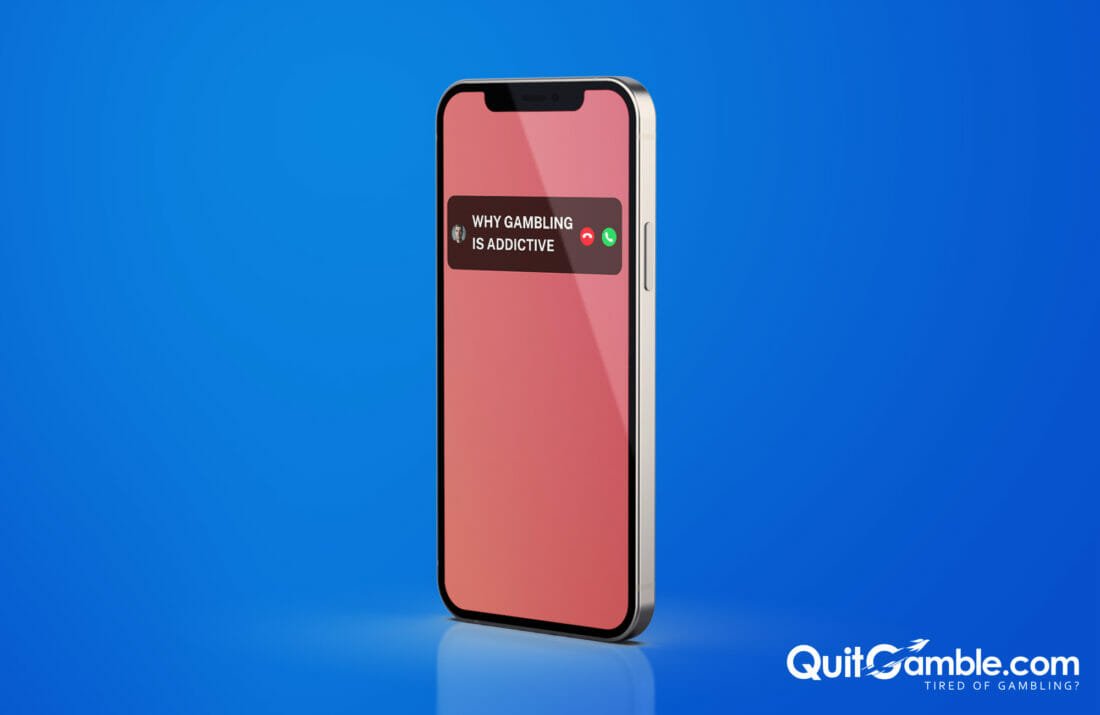Has anybody warned you about gambling harm? Why is gambling addictive? Let’s take a deeper look at that question. This article can be very helpful for you if you have a gambling spouse or partner.
To understand why gambling is addictive, we must focus on what gambling does for us. If gambling didn’t do anything for us, it would be easy to stop gambling. Why would we continue? Gambling might create excitement, but it can cost a lot of money.
If gambling doesn’t do anything for us, we will stop as soon as the adverse effects of gambling would be larger than the positive (the excitement). BUT THAT’S OFTEN NOT THE CASE. People keep playing, people keep smoking, and people keep drinking even if they know that it’s terrible for them.
WHY?
When people come to QuitGamble.com, the questions we ask them are:
- What is gambling doing for you?
- What happens when you gamble?
- Does it create a moment of peace, a moment when nothing else matters?
These questions are another way to ask: Why do you gamble? But the questions don’t carry any judgment. Gambling is addictive because it has an impact on people. Gabor Maté once said: Don’t ask why the addiction. Ask why the pain.
Why gambling is addictive
Game developers use sophisticated techniques to make casino gambles as exciting as possible. The more dopamine the games trigger the brain to release, the more absorbing the games become. Why gambling addictive? Because the anticipation of a win releases dopamine in the brain. Dopamine feels terrific, but dopamine isn’t just a feel-good hormone (neurotransmitter). Dopamine also works as a pain killer.
It’s no wonder why gambling is addictive when you look at the dopamine response gambling creates.
How addictive is gambling?
Gambling can be very addictive; people can develop a gambling addiction in days. How addictive gambling is, depends on the person’s past experiences and how much pain they experience at the moment before they gamble.
Let’s say the person had a divorce and feels isolated and alone. These feelings are painful, and negative emotions will likely temporarily be suppressed if the person gambles.
If you could take a pill that made loneliness and isolation disappear, would you take it? When gambling has the effect of numbing painful feelings, gambling becomes addictive. The brain is programmed to get away from pain. It doesn’t know what the long-term consequences of gambling can be. The brain learns that gambling is one way to escape the pain.
So, what happens? How is gambling addictive?
When the brain learns that gambling works like anesthesia, the person will feel an urge to gamble as soon as he/she experiences any pain. The brain has created a habit:
- Cue (trigger) = Pain
- Routine (Action) = Gamble
- Reward = Pain goes away
(From the book Power of Habits.)
Example: A person comes home from work. Nobody is home, and the person has no plans for the evening. Soon boredom (a kind of pain) creeps up upon him. Boredom is a common cue to start a gambling habit. Gambling becomes the routine/action that helps the brain forget how dull the evening is.
What casino games are most addictive?
During 2023, we did a survey among our members on QuitGamble.com. In total, we got more than 700 responses. One of the questions we asked was: what games do you gamble most on? What we wanted to understand was: What types of games do gambling addicts mostly play? The answer was casino slots. Worldwide, 74% of problem gamblers play slots. In the US, that number is even higher at 85%. If 85% of gambling addicts play slots, slots are the most addictive casino games!
Other popular games are live casinos like blackjack, roulette, and baccarat. About 32% play live casino games, 17% play lotteries, and 12% play slots. Our gambling addiction statistics page also reports that 50.2% of slots players have gambling problems.
Why are people addicted to gambling
Gambling has become the brain’s solution to handle the pain of a gambling addict. That’s the logic behind the addiction. However, common sense isn’t enough to stop addiction because an addict rarely thinks logically. Some gambling addicts can sit outside the casino crying because they know they will lose their money, but the pull of the gambling addiction is so strong (the brain wants to get rid of the pain) that they eventually go into the casino.
The answer to why are people addicted to gambling is that gambling is their way of handling pain. The pain is so intense that the compulsive behavior overpowers them.
To break free of gambling, stopping gambling is unlikely to be enough. Remember how a habit works: Cue – Action – Reward. Gambling is the action. Sometimes alcoholics switch alcohol to gambling or the other way around. Different actions, but they lead to the same reward.
The way to beat gambling addiction is to break the trigger. We need to understand what gambling does for us (the reward), and we need to understand what causes us pain.
You can do the Happiness Test to help you better understand what causes pain in your life. It’s not going to say that you’re addicted to gambling. Instead, it’ll help you understand why stopping gambling is so challenging.
